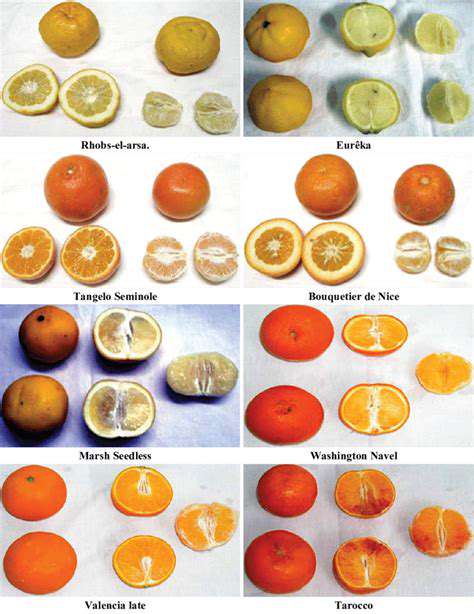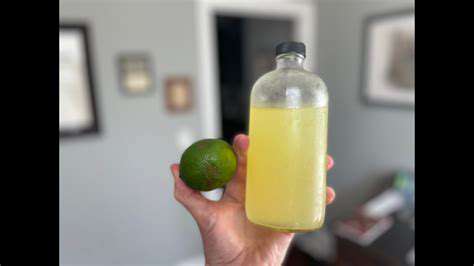How to Store Citrus Fruits: Keep Them Fresh
Jul 08, 2025 / btwgardenmachine/
Choosing the Perfect Citrus Fruit
Selecting the Right Citrus
When choosing citrus fruits, look for those that are firm to the touch. Avoid any that feel soft, mushy, or have noticeable blemishes. The skin should be smooth and free of any significant damage or bruising. A bright, vibrant color is generally a good indicator of ripeness and freshness. Consider the specific type of citrus fruit you're purchasing – oranges, lemons, limes, grapefruits, mandarins – as each might have slightly different visual characteristics when ripe and ready to eat. Paying close attention to these details will help you select the most flavorful and enjoyable citrus fruits.
Inspect the fruit's stem or leaves for firmness. A firm stem or leaves suggest the fruit is fresher and less prone to spoilage. Avoid fruits with loose or wilted stems or leaves, as this indicates that the fruit may be overripe or beginning to rot. Also note the overall shape and size of the fruit. Fruits that are symmetrical and appear plump are generally more likely to be of higher quality. A fruit that appears misshapen or has uneven coloring might indicate previous damage or a less desirable internal structure.
Proper Storage Techniques for Maximum Freshness
To maximize the lifespan of your citrus fruits, proper storage is crucial. Store them in a cool, dry place, away from direct sunlight and heat sources. A refrigerator is ideal for extending the shelf life of citrus fruits, particularly those that are not yet fully ripe or if you anticipate needing them to last longer. However, keep in mind that some citrus fruits, such as mandarins, can lose flavor if stored in the refrigerator for too long.
Avoid storing citrus fruits next to other fruits that produce ethylene gas, such as apples or bananas. This gas can accelerate the ripening process and lead to faster spoilage. Also, ensure that the citrus fruits are stored in a well-ventilated area to prevent moisture buildup, which can contribute to mold growth. Use perforated plastic bags or containers for storing citrus fruits, allowing for proper airflow to prevent moisture buildup and maintain freshness.
Extending the Shelf Life of Your Citrus Harvest
For optimal freshness, select citrus fruits that are firm and have intact skins. Avoid those with soft spots, bruises, or cuts. Once you've selected your citrus, store them properly to prevent premature spoilage. One important technique is to store them in a cool, dark place, ideally a pantry or a cool, ventilated area of your home. This will help maintain the fruit's quality, preventing the development of mold and maintaining its flavor.
Another key aspect is preventing moisture buildup. Store citrus fruits in perforated plastic bags or containers to allow for proper airflow. This will help maintain the fruit's freshness and prevent the development of mold. Additionally, avoid storing them near ripening fruits like apples or bananas as this can accelerate their ripening process. By following these simple guidelines, you can enjoy the delicious taste and aroma of your citrus fruits for a longer period, maximizing your harvest and minimizing waste.
Properly storing citrus fruits can significantly extend their shelf life. By understanding the ideal conditions for storage and avoiding common mistakes, you can enjoy fresh, flavorful citrus for weeks to come. The key is maintaining the ideal balance of temperature, humidity, and exposure to ethylene gas. Keeping citrus fruits away from heat, light, and ethylene-producing fruits will significantly extend their freshness and prevent premature ripening.
Optimizing Storage Environments for Citrus Fruits
Proper Temperature Control
Maintaining the ideal temperature range is crucial for preserving the quality and extending the shelf life of citrus fruits. Different varieties of citrus have slightly different optimal temperatures, but generally, a cool, dry environment is best. Storing citrus fruits in a refrigerator is often recommended, but the specific temperature and duration of refrigeration can vary depending on the type of fruit and the desired outcome.
Excessive heat can accelerate ripening and lead to rapid decay, while temperatures that are too low can cause chilling injury, resulting in undesirable texture and flavor changes. Careful monitoring and consistent temperature control are essential for maximizing the quality and lifespan of your citrus harvest.
Humidity Levels
Maintaining appropriate humidity levels is just as vital as temperature control. High humidity can encourage fungal growth and moisture damage, while excessively low humidity can lead to dehydration and shriveling of the fruit. The ideal humidity level for storing citrus fruits typically falls within a range of 50-70%. Using moisture-absorbing materials or humidity-controlled containers can help regulate these levels and maintain the quality of your citrus fruits.
Air Circulation
Proper air circulation is essential for preventing the build-up of moisture and ethylene gas, a natural ripening agent. Poor air circulation can lead to uneven ripening, accelerated decay, and fungal growth. Storing citrus fruits in well-ventilated areas or using containers with adequate gaps will allow for proper air circulation and maintain the integrity of the fruit.
Light Exposure
Citrus fruits are sensitive to light exposure, particularly prolonged exposure to direct sunlight. Light can cause discoloration and affect the flavor and texture of the fruit. Storing citrus fruits in a dark, cool environment or using opaque containers is highly recommended to minimize light exposure and maintain their quality. Exposure to strong light can accelerate ripening and lead to premature decay.
Proper Handling and Storage Containers
Careful handling and appropriate storage containers are crucial for preventing damage and preserving the quality of citrus fruits. Avoid bruising or damaging the fruit during handling. Select containers that are clean, dry, and allow for sufficient air circulation. Using mesh bags or perforated containers can improve airflow and help prevent moisture buildup, while airtight containers may be suitable for short-term storage but not for extended periods.
Ethylene Gas Management
Ethylene gas is a natural plant hormone that accelerates the ripening process. When storing multiple citrus fruits, consider placing them away from other fruits that produce ethylene, such as apples or bananas. These fruits can significantly speed up the ripening of citrus, leading to premature decay. Using ethylene-absorbing materials or specialized storage containers can help mitigate the effects of ethylene gas and maintain the freshness of your citrus produce.
Variety-Specific Considerations
Different citrus varieties have unique characteristics that influence their storage requirements. For example, some varieties are more susceptible to chilling injury than others. Understanding the specific needs of each citrus variety is crucial for optimizing their storage and maximizing their shelf life. Researching the particular characteristics of the citrus fruits you are storing will allow for tailored storage practices and the best possible outcome.


Tips for Citrus Fruit Preservation
Freezing Citrus Fruits
Freezing citrus fruits is a great way to preserve them for use throughout the year. To achieve the best results, carefully wash and dry the citrus fruits, then slice or segment them. Place the prepared citrus in a single layer on a baking sheet lined with parchment paper. Freeze for a few hours until solid, then transfer the frozen pieces to freezer bags or containers. Freezing citrus in this manner helps maintain its texture and flavor, allowing you to use it in smoothies, desserts, or as a healthy addition to your winter meals.
Freezing citrus also allows for portion control, making it easy to add a specific amount of citrus to recipes without having to deal with the whole fruit. This method is particularly useful for fruits like lemons and limes, which can be difficult to store fresh for extended periods.
Drying Citrus Fruits
Drying citrus fruits is an excellent method for preserving their flavor and nutrients. Start by washing and drying the citrus. Then, thinly slice or segment the fruit. Lay the slices or segments on a dehydrator tray, making sure they aren't overlapping. Set your dehydrator to the appropriate temperature and time, typically around 65 degrees Celsius for several hours, or until the fruit is completely dry and leathery. Store the dried citrus in airtight containers in a cool, dark place.
Dried citrus fruits can be used in various culinary applications. They add a delightful tang to baked goods, granola, or trail mix. They can also be rehydrated and used in recipes that call for fresh citrus.
Canning Citrus Fruits
Canning citrus fruits allows you to enjoy them year-round, preserving their vibrant flavor and nutrients. Select firm, ripe citrus fruits, wash them thoroughly, and remove any blemishes. Prepare the fruit by peeling, segmenting, or juicing, depending on your desired use. Follow a safe canning recipe carefully, ensuring proper sterilization of jars and lids. Process the filled jars according to the specific canning guidelines to create a shelf-stable product.
Storing Citrus Fruits in the Refrigerator
Storing citrus fruits in the refrigerator can extend their shelf life. Choose fruits that are firm and ripe, avoiding those that show signs of bruising or decay. Store them in a perforated plastic bag or container in the crisper drawer, a cool area of your refrigerator. This method helps maintain their freshness and flavor for several weeks, particularly for lemons, limes, and grapefruits.
Using Citrus Zest for Preservation
Citrus zest, the outermost layer of the fruit, has a concentrated flavor and can be used for preservation. Gently remove the zest using a vegetable peeler or zester. Dry the zest thoroughly and store it in an airtight container in the refrigerator or freezer. This preserves its vibrant flavor and aroma for use in baking, marinades, or sauces. Citrus zest adds a bright and zesty touch to your culinary creations.
Proper Handling and Storage
Proper handling and storage of citrus fruits are crucial for maintaining their freshness. Avoid storing citrus fruits next to ethylene-producing fruits like apples or bananas, as this can accelerate their ripening process. Select fruits that are firm and heavy for their size. Avoid placing citrus fruits directly on surfaces, as this could lead to bruising. Store citrus in a cool, dry place, away from direct sunlight. Proper handling and storage will keep your citrus fruits fresh for weeks.
Citrus Fruit Preservation in the Pantry
Storing citrus fruits in the pantry, particularly for longer-term storage, requires careful consideration of factors like temperature and humidity. Choose fruits that are firm and ripe. Store them in a cool, dry area of the pantry, away from direct sunlight and heat sources. Use breathable containers or paper bags to allow for air circulation. Regularly check the fruits for signs of spoilage, and discard any that show signs of decay. This method can help preserve citrus fruits for a few weeks, but it is not as effective as refrigeration or freezing.